気候変動への対応
JTBグループの「サステナビリティ方針(3)地球上の自然資源と生物多様性の保全」に基づき、地球上の資源に配慮して、気候変動対策・環境保護に取り組み、限りある自然資源を次世代に引き継ぎ、企業活動を通して使用される水やエネルギーの利用量を削減するとともに、より環境負荷の低いエネルギー源の利用を進めてまいります。
本方針に基づき、2025年4月に「JTBグループ環境方針」を定め、さらに「JTBグループ環境ガイドライン」を作成しました。これらは、JTBグループの役員ならびに社員(出向社員、駐在社員、派遣社員、アルバイト含む)を対象としています。
- JTBグループ環境方針
-
- 法令遵守と国際的な規範への対応
- 気候変動対策の強化
- 資源の適切な利用と廃棄物の削減
- 水資源の適切な利用
- 生物多様性の保全と再生
- 地域コミュニティへの貢献
- 自然・文化遺産の保護
- 社員への教育
- 社員・ステークホルダーとの対話と情報開示
- 環境マネジメントシステムの構築
- TCFDのフレームワークに沿った情報開示
-
当社はTCFDのフレームワークに沿って、リスクの種類と対応方針等に関する内容等の情報開示を行っています。
- 指標と目標
-
JTBグループでは、事業活動における環境負荷を段階的に削減し、2050年度までにカーボンニュートラル(温室効果ガスの排出量実質ゼロ)を目指しています。その実現に向けて、地球規模での環境の変化を捉え、交流を創造するすべての事業を持続可能なものとするために、カーボンニュートラルに関する長期目標(2050年)と中期目標(2030年)を設定しています。
長期目標は組織の持続的な運営のもとビジョンの実現、リソースの計画的かつ効果的配分、リスク管理、ステークホルダーとの良好な関係構築など、組織の未来を支える重要なものとして位置づけ、また中期目標は長期目標に向けた段階的なステップを明確にして、長期的ビジョンや戦略目標を達成するための重要な指針として位置づけています。
さらに単年目標を設定し、短期の時間軸で定義した戦略策定により、中長期の時間軸に比して迅速に計画の軌道修正や優先事項の見極めにつなげ、社会環境の変化への対応に備えます。中期目標
2030年度までに自社が排出するCO2排出量の実質ゼロ達成(スコープ1、スコープ2)長期目標
2050年度までに事業活動全体でカーボンニュートラル達成(スコープ1、スコープ2に加え、自社のサプライチェーンからの排出であるスコープ3を含む)JTBグループのカーボンニュートラル目標
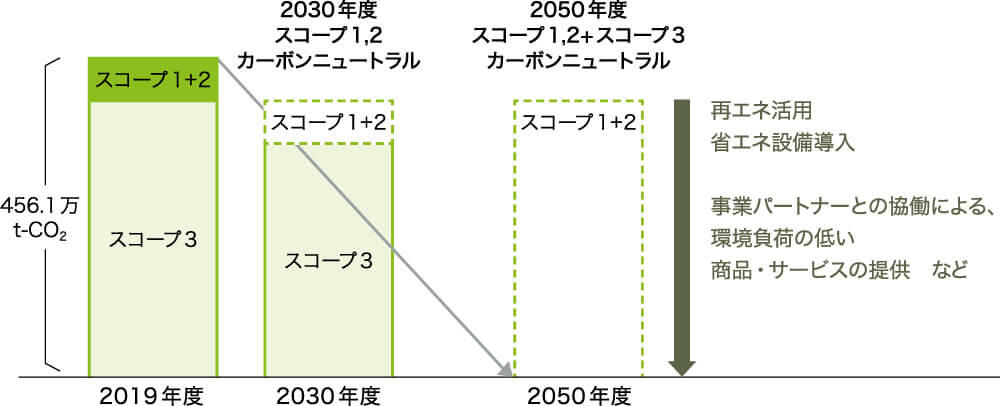
※スコープ3の目標は環境省のガイドラインに従って設定。
募集型・受注型企画旅行商品に関する排出を対象としており、手配型旅行商品に係る排出は含まないものの、削減対策は共通して推進する。
※2019年度実績は、JTBグループ最新数値に修正した数値(単位:t-CO2) 2019年度
実績2022年度
実績2023年度
実績2024年度
実績2025年度
目標2030年度
目標総合計
(スコープ1-3計)4,561,667 1,553,402 2,388,108 2,702,113 ⇒ 3,697,915 3,257,500 スコープ1 2,090 1,756 1,551 1,848 ⇒ 1,347 0 スコープ2 34,953 17,116 17,018 9,284 ⇒ 12,156 0 スコープ1+スコープ2 37,044 18,872 18,569 11,132 ⇒ 13,503 0 スコープ3
全カテゴリー計4,524,623 1,534,530 2,369,539 2,690,981 ⇒ 3,684,412 3,257,500 ※2019年度~2023年度実績はJTB単体の実測値をもとにJTBグループ全体は推計値で算出しており、2024年度実績は極力、推計値から実測値への転換を図って算出しています。
※2025年度目標数値は、2023年度実績判明時点で策定したものです。2024年度CO2排出量
スコープ / カテゴリ 2024年度実績 排出量(t-CO2) 2019年度比(%) スコープ1-3合計値 2,702,113 59.2 スコープ1, 2 11,132 30.0 スコープ3 購入した製品/サービス
2,690,981 59.5 資本財
燃料・エネルギー関連の活動
上流の輸送・流通
事業において発生した廃棄物
出張
社員の通勤/在宅勤務
上流リース資産
下流の輸送・流通
販売した製品の加工
販売した製品の使用
販売した製品の使用後処理
下流のリース資産
フランチャイズ
投資
CO2排出量全スコープ)については、2023年度実績分において一般財団法人日本品質保証機構による独立した第三者検証を受審しており、その算定ロジックをもとに2024年度実績を算定しています。
- 推進のための取り組み
-
スコープ1・2に関する取り組み
JTBグループでは、2030年の中期目標としているCO2排出量スコープ1・2のカーボンニュートラルの目標達成に向け、JTB単体における施策とCO2排出削減計画を策定しています。一方、海外拠点を含むJTB単体以外については、CO2排出量の推計値から実測値への転換を図ったうえで、具体的な計画を今後策定する予定です。
スコープ1については、JTB単体における営業車の低炭素化に向けた転換を図ります。また、スコープ2については、各拠点における省エネルギー施策を起点にした展開を図り、省エネルギー施策では削減できないCO2排出量分について、再生可能エネルギー利用・非化石証書購入でカーボンニュートラルの実現を目指します。JTBグループでは、各拠点が入居するビル等の貸主様側との相互理解をもとにした施策の検討を行い、2030年度までのカーボンニュートラル実現を目指して各年の削減計画を策定します。(単位:
t-CO2)2023年度
CO2排出量実績(JTB単体)2025年度
計画における主要施策施策によるCO2排出削減量 備考 スコープ1 1,097 営業車の低炭素化 204 営業車の低炭素車への車両転化については、現契約の契約切り替え時間に合わせて対応 スコープ2 9,299 省エネルギー施策、再生可能エネルギー利用、非化石証書購入 2,274 LED照明切り替え、空調省エネルギーシート導入による電気使用量の削減
季節に応じた推奨温度で室内温度を設定し、それに関連しクールビズ・ウォームビズを推進モバイルPCの使用にあたり待機時間の設定スコープ3への取り組み
スコープ3におけるCO2削減を実現するため、お客様向け商品・サービスの拡充に努めます。またスコープ3の削減には事業パートナーとの協業が欠かせないため、関係各所との連携を深めていきます。取り組み事例1:CO2ゼロ旅行®
CO2ゼロ旅行®は、旅行中に排出するCO2をJ-クレジット制度を活用することで実質ゼロにするものです。J-クレジット制度とは、適切な森林管理によるCO2等の吸収量や、再⽣可能エネルギーの利⽤によるCO2等の排出削減量、省エネルギー設備の導⼊等"プロジェクト"を、「クレジット」として国が認証する制度です。CO2ゼロ旅行®では、森林由来のJ-クレジットを採用しています。CO2ゼロ旅行®イメージ図
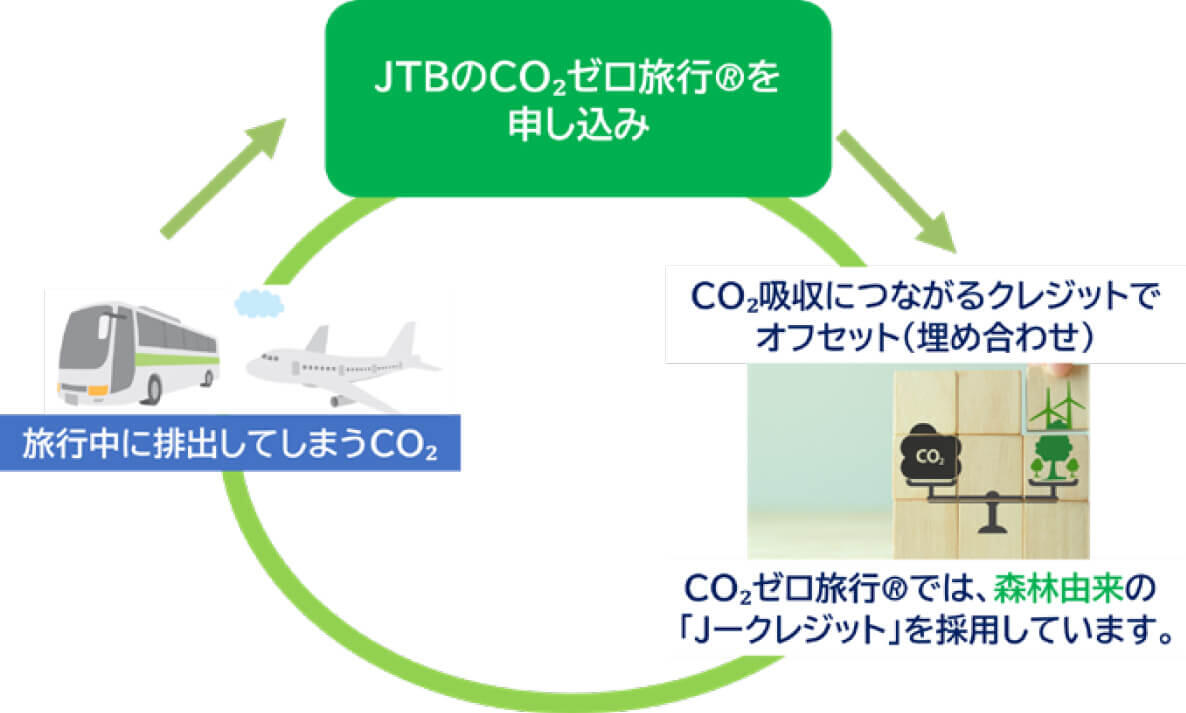
CO2ゼロ旅行販売数
指標 2024年度 実績 申し込み件数 対象人数 オフセット量 CO2ゼロ旅行販売数 1,390件 70,257人 1,087t(1,087,339Kg) 取り組み事例2:JTB Green Wings
SAFを活用したCO2削減プログラムとして航空会社と共同開発による『JTB Green Wings 』を販売開始しました。
企業向けには『JTB Green Wings』にて出張等で渡航する際に環境価値を購入できる仕組を設定しました。
また学校向けには『JTB Green Wings for School 』という商品を用意しており、修学旅行前にSAFなど脱炭素に関する基礎知識を習得できる特別講義を実施いたします。
上記いずれの場合も旅行後にCO2削減証書を付与します。※SAF(Sustainable Aviation Fuel):持続可能な航空燃料。原料の生産・調達から製造、輸送、燃焼までのライフサイクルで、従来のジェット燃料比でCO2排出量を平均80%削減可能とされる。
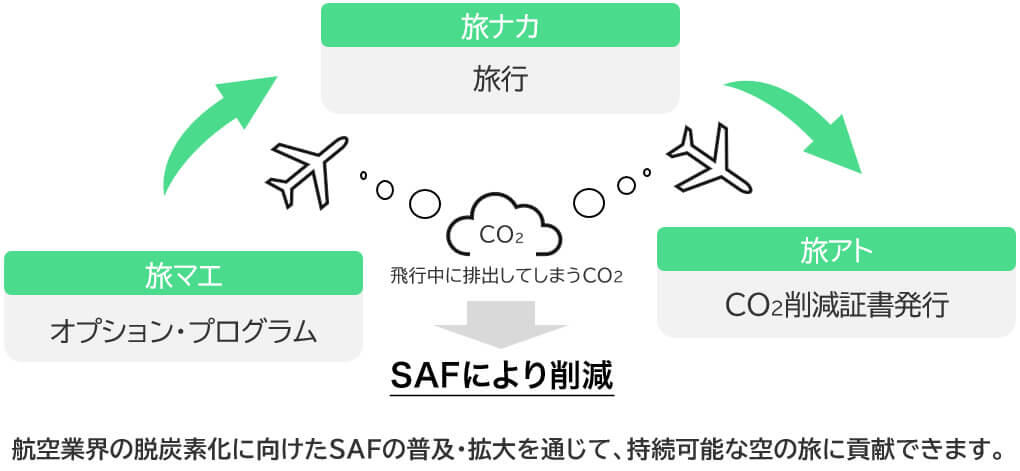
生物多様性の保全、および資源・廃棄物、水への対応
JTBグループの「サステナビリティ方針(3)地球上の自然資源と生物多様性の保全」、および2025年4月に定めた「JTBグループ環境方針」において、生物多様性保全に取り組み、限りある自然資源を次世代に引き継ぎ、企業活動を通して使用される水やエネルギーの利用量を削減するとともに、より環境負荷の低いエネルギー源の利用を進めています。
具体的には、生物多様性保全に向けて、動植物の違法な取引禁止や動物福祉の考え方も踏まえ、国際的、または事業活動を行う地域で保護されている動植物に影響のある事業に関わりません。また、事業の運営にあたっては、生物の生息地を保全するために、紙資源やプラスチックなどの使い捨て消費財の利用削減を図るとともに、サステナブルな製品やサービスの調達を推進します。リサイクルやプロセスの見直しなどを通して、廃棄物や排水・排ガスの排出を削減するとともに、有害物質の除去に努めます。排出物は、事業活動を行う国や地域の基準に沿って適切に処理します。資源、電気、廃棄物、紙の利用を減らし、紙のリユース・リサイクルの社内啓発を行っています。
- TNFDのフレームワークに沿った情報開示
-
当社はTNFDのフレームワークに沿って、リスクの種類と対応方針等に関する内容等の情報開示を行っています。ただし、2025年3月現在、当社の取り組みはまだ始まったばかりであり、対象エリアの特定やリスク・機会の分析についても、今後さらに深掘りが必要な状況です。今後は、ステークホルダーとのコミュニケーションを通し、当社の課題と取り組みの方向性を具体化し、持続可能な社会の実現と自然資本・生物多様性の保全に向けた取り組みを一層加速させていきます。
- 指標と目標
-
JTBグループでは、生物多様性が気候変動や資源管理、廃棄物など、さまざまな環境課題の影響を受けると認識し、これらの課題を包括的に解決することを目指しています。
その中で、特に「気候変動(GHG排出や異常気象)」および「廃棄物・汚染」を、当社(直接操業)にとって特に重要なリスクとして特定しました。当社は2050年までにCO2排出量ゼロを達成する目標を掲げており、さらに新たに重要リスクとして特定した廃棄物に関して、以下の目標を設定しました。長期目標 2050年までに廃棄物最終埋立処分ゼロ
- 推進のための取り組み
-
生物多様性保全の取り組み
取り組み事例1:外来種に関する体験プログラムの実施JTBでは、青森市の観光関連企業が設立した「八甲田樹氷国際ブランド化推進会議事務局」における意見交換会の中で、「山頂付近に外来種が増えている」という課題が挙げられたことを受け、地元のガイド事業者とともに青森県に提案を行い、体験型プログラムを商品化しました。
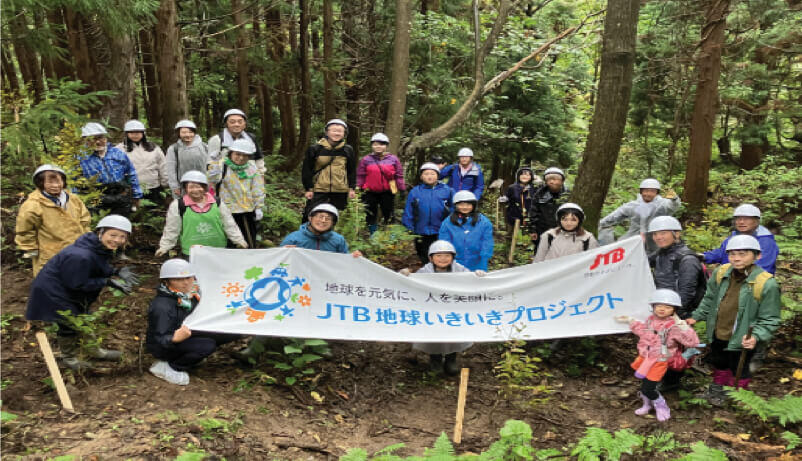
このプログラムでは、山頂付近で外来種(ヘラオオバコなど)の駆除を実施し、作業終了後には酸ヶ湯温泉まで毛無パラダイスラインのトレッキングを楽しむ内容となっています。また、観光客の靴底に付着して運ばれた外来種の草や根を「根起こし」という専用器具を用いて取り除き、高山植物の保護にも貢献する仕組みを組み込んでいます。本プログラムの参加者は延べ23名となっており、今後も拡大を目指します。
2024年度には白神山地周辺のブナ林に8.9ヘクタールの植樹を行い、自然保護に貢献しました。廃棄物削減の取り組み
各取り組みの目標と実績指標 2024年度 実績 2025年度 目標 2028年度 目標 アメニティリサイクル施設の増加 20施設 30施設 50施設 指標 2024年度 実績 2025年度 目標 2028年度 目標 電子チケット流通プラットフォームの拡大による紙チケットの削減 1,006,680枚 11,348,724枚 25,830,000枚 決済事業新システムへの移行による紙伝票(ロール紙)の削減 91,854本 48,505本 51,473本 ロス旅缶 858缶 5,000缶 15,000缶 取り組み事例1:宿泊施設におけるアメニティ製品の水平リサイクル
JTB商事は、一般社団法人アメニティ・リサイクル協会の設立時から参画しており、2023年から宿泊施設で使われるアメニティ製品に関して、水平リサイクルを目指した活動により、CO2削減を推進することで、宿泊業界全体のサステナブルな発展に向けた取り組みを行っています。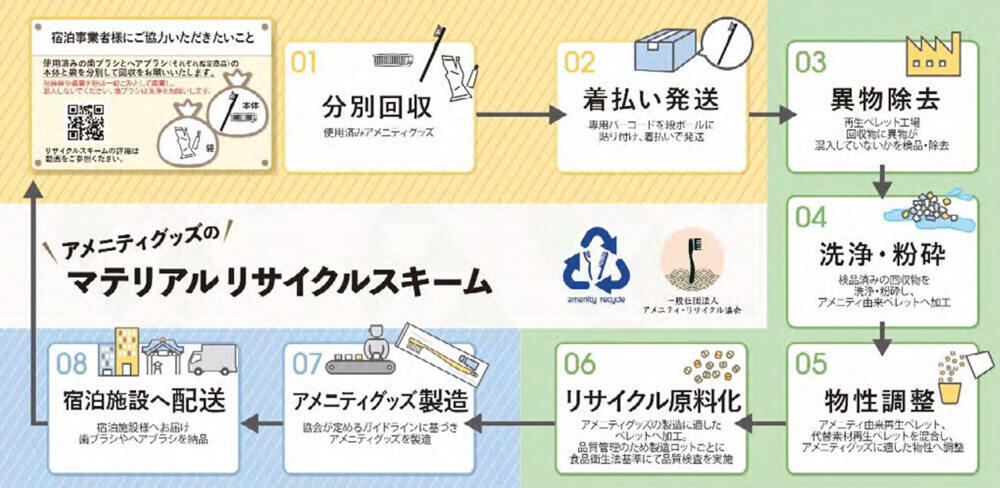
取り組み事例2:デジタル化による事業パートナーの紙削減の支援
デジタルプラットフォームサービス:QRコード※を活用したグッドフェローズJTBの電子チケット流通プラットフォームTicketHUB®や、旅ナカコンテンツの予約在庫の一元管理を実現するJTB BÓKUN等の電子化サービスにより紙資源の削減を進めています。※QRコードは株式会社デンソーウェーブの登録商標
決済:JTBビジネスイノベーターズは、決済端末の切り替えによる紙伝票の削減や、申込書の電子化による紙資源利用廃止に取り組んでいます。
取り組み事例3:食品ロスの削減を目指す「ロス旅缶」
日本では、収穫されたにもかかわらず市場に出回らない規格外野菜が年間約177万トンにのぼると推計されています。
これらの廃棄物は焼却や埋立処理により温室効果ガス(GHG)を排出する原因にもなっており、持続可能な食資源管理が課題となっています。
JTBはこのような課題に対応するため、提携農家から規格外野菜を買い取り、シェフ監修のレシピにより加工した缶詰「ロス旅缶」を開発・提供しています。これまでには約513㎏の未利用野菜を使用し、19,000個の缶詰を製造。2025年はこれらのうち5,000缶の販売を目標としています。
今後も地域・企業連携を通じ、食品ロス削減量の拡大と循環型モデルの確立を目指しています。取り組み事例4:農産物の廃棄削減を目指す「瀬戸内ライム研究所」
瀬戸内海に浮かぶ高根島・生口島にある地元農園では、年間2トンのライムを栽培していましたが、知名度の低さから多くを廃棄せざるを得ない状況でした。この状況を改善するため希少性の高い「瀬戸内産ライム」としてのブランド化と事業化を目指し、2023年から本格的に仕入・卸・販売を開始しました。さらに、2025年4月から休耕地を開拓し、自社農園(CTS農園)も始めています。今後、他業種との共創も含めて事業のさらなる拡大を目指しています。
2024年度の実績は1,300kgでした。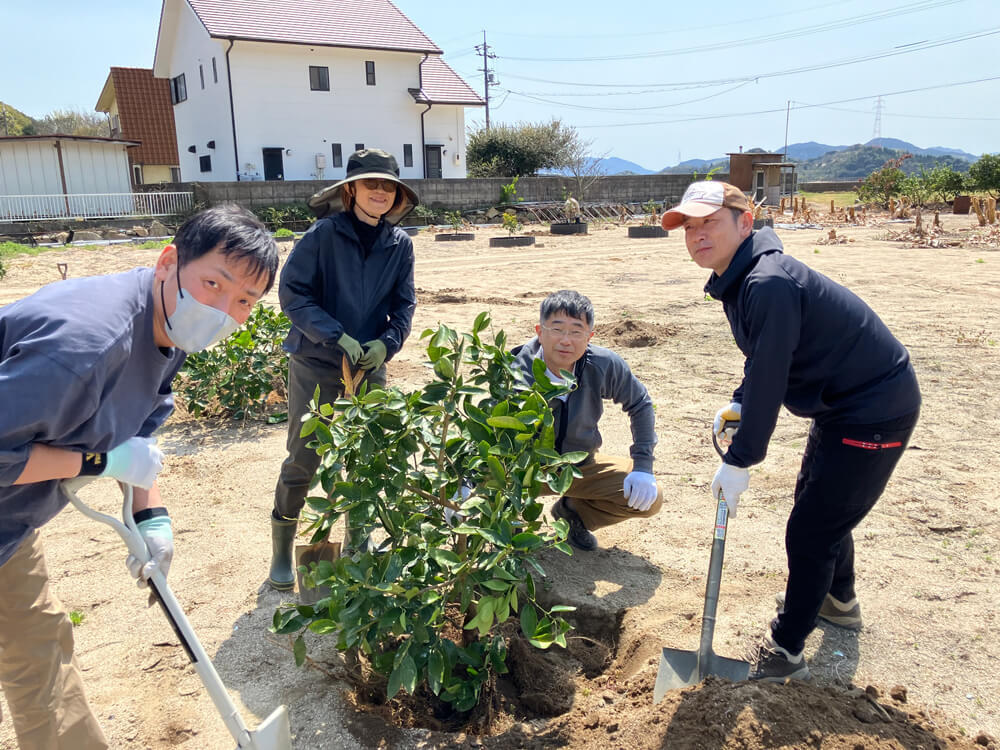
取り組み事例5:オフィスにおける廃棄物削減の取り組み
廃棄物削減の中長期目標に向けて、廃棄物量の把握、分別の徹底、削減を段階的に進める計画を立てています。天王洲本社ビルでは、分別を徹底するための掲示物を設置し、一部のフロアでは個人用ゴミ箱を撤去するなど、日常の業務の中でできる取り組みを始めています。また、8つの事業部が入る新宿ブロックでは、事業部ごとに廃棄物の計測値を可視化する試行により、社員一人ひとりの意識と行動の変化を促しました。 - 水資源への対応
取り組み事例1:フィリピンでの給水事業の支援
交流は豊かな地球環境によって育まれた、地域の魅力や資源によって成り立っています。そのためJTBは地域支援のために、フィリピン南部ミンダナオ島のタグム市において、コンテナ型純水製造給水事業を支援し、安全な飲料水を地域の皆さまにお届けしています。2022年5月より開始し、2025年4月の時点で1,077,636リットルの水を提供しました。
- ガバナンス・推進体制
- 重要課題(マテリアリティ)
-
-
・心豊かなくらし
-
・人々をとりまく環境
-
・パートナーシップ
-


